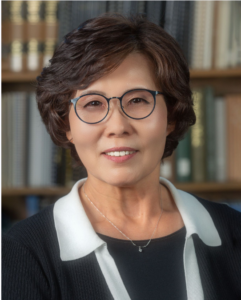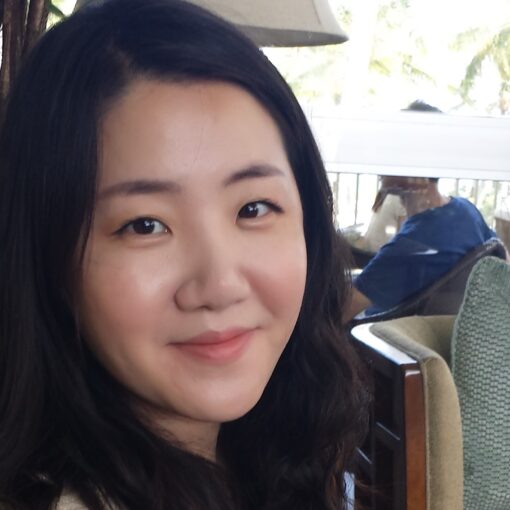Yunah Sung (she/her/hers) has been the Korean Studies Librarian at the University of Michigan since 2003. Before that, she served as the Asia Bibliographer at the Cleveland Museum of Art. During her tenure at the University of Michigan, she has also taken on additional roles, including Interim Head of the Asia Library, Head of Technical Services, and Project Manager.
 How did your journey in working with East Asian libraries and collections begin?
How did your journey in working with East Asian libraries and collections begin?
My educational background is in linguistics. I studied Japanese language and literature at Sungshin Women’s University in Seoul, Korea, and received a master’s degree from Yonsei University in Teaching Korean as a Second Language. Upon relocating to the United States with my family, I had the opportunity to audit classes at the School of Library and Information Studies (SLIS) at the University of Alabama, an entirely new discipline that piqued my interest and prompted my formal enrollment.
When I was a graduate student, there were hardly any openings for Korean studies librarian positions. I was fortunate to begin my career at the Cleveland Museum of Art as an Asian Bibliographer, leveraging my proficiency in Korean and Japanese to assist patrons and manage the East Asian collections in various formats. My duties also encompassed cataloging and contributing to the ArtNACO funnel in name authority records. My first job provided me with a solid foundation in the intricacies of the East Asian book markets, as well as practical knowledge in collection management and technical services.
What did you enjoy most about your career in East Asian librarianship?
It has been my immense privilege to serve as a Korean Studies Librarian at the University for over twenty years, and I’m filled with a sense of eagerness for the day ahead as I enter the library each morning. I enjoy every facet of my job, yet the most rewarding aspects include interacting with students and faculty and developing an exceptional Korean Studies collection. As a subject librarian specializing in Korean Studies, I cater to a diverse group of students and faculty from various colleges and departments within and beyond the campus. Their varied research subjects and questions not only give me a chance to support their academic endeavors but also enhance my own expertise on a multitude of subjects, keeping me informed about contemporary issues relevant to South Korea, North Korea, and the surrounding regions.
What did you regard as your achievements/accomplishments in the field?
As I contemplate this question, the first thing that comes to mind is my long-standing colleagues at the Asia Library and my fellow Korean Studies librarians in North America. Thanks to their continued partnership and support, I have been able to successfully carry out various projects.
In Michigan, I have developed the Korean Art Song Collection and the Korean Language Learning Collection to support students and faculty members. Additionally, I am engaged in a project titled ‘The History of Koreans and Korean Studies at the University of Michigan,’ which traces over 100 years of Korea-related individuals and influences.
In collaboration with my fellow Korean Studies librarians, I have participated in numerous projects, including the ‘Collective Subscription of Korean e-resources’ (2003), the ‘ALA-LC Korean Romanization and Word Division’ (2009), and the ‘Handbook for Korean Studies Librarianship Outside Korea’ (2014).
What change(s) and trend(s) in East Asian librarianship had you witnessed and envisioned?
In terms of collections, the breadth of East Asian collections has broadened from traditional literature and historical resources to embrace contemporary content including K-pop, Manhwa, and online visual materials. Such diversification mirrors a broader cultural interest and scholarly attention to contemporary popular culture.
Regarding East Asian librarianship, multitasking is one of the key skills possessed by all our colleagues in the field of East Asian studies. Beyond subject knowledge, we are responsible for collection development, user services, and many in-house as well as external projects that encompass digital humanities, open access, digitization, and exhibitions. Some colleagues are also tasked with cataloging library resources. We wear many hats throughout the day and might need more to keep up with new trends and needs!
In an effort to highlight the library’s collections and enable broader access to resources, there has been a continuing move toward the digitization of East Asian collections. I believe that digitization-related projects will continue to grow, utilizing digital humanities tools such as visualization and text mining. Acquiring knowledge and practical experience in digital humanities projects is indispensable, necessitating ongoing professional development, collaboration with one’s own institution’s digital scholarship team, and partnerships with fellow East Asian studies librarians. I hope that CEAL will continue to provide leadership and support to its members, enabling us to share expertise with each other to enhance services for users whose needs will continually evolve.
Tell us about your favorite book or series:
As a first-generation immigrant to the U.S., I am interested in immigration-related topics, including history, culture, heritage, diversity, biography, the impact of religion, and generational gaps. ‘Crying in H Mart: A Memoir’ by Michelle Zauner and ‘Pachinko’ by Min Jin Lee are among my favorites, as well as my daughter’s.
Tell us some fun facts about you:
I am passionate about learning and teaching languages. I have voluntarily taught the Korean language to students ranging from 5 to over 70 years old at various locations and communities. Preparing for each class is immensely enjoyable, and watching each student’s Korean language skills improve is incredibly rewarding. If any of you would like to learn Korean, I would be more than happy to offer free Zoom classes!





